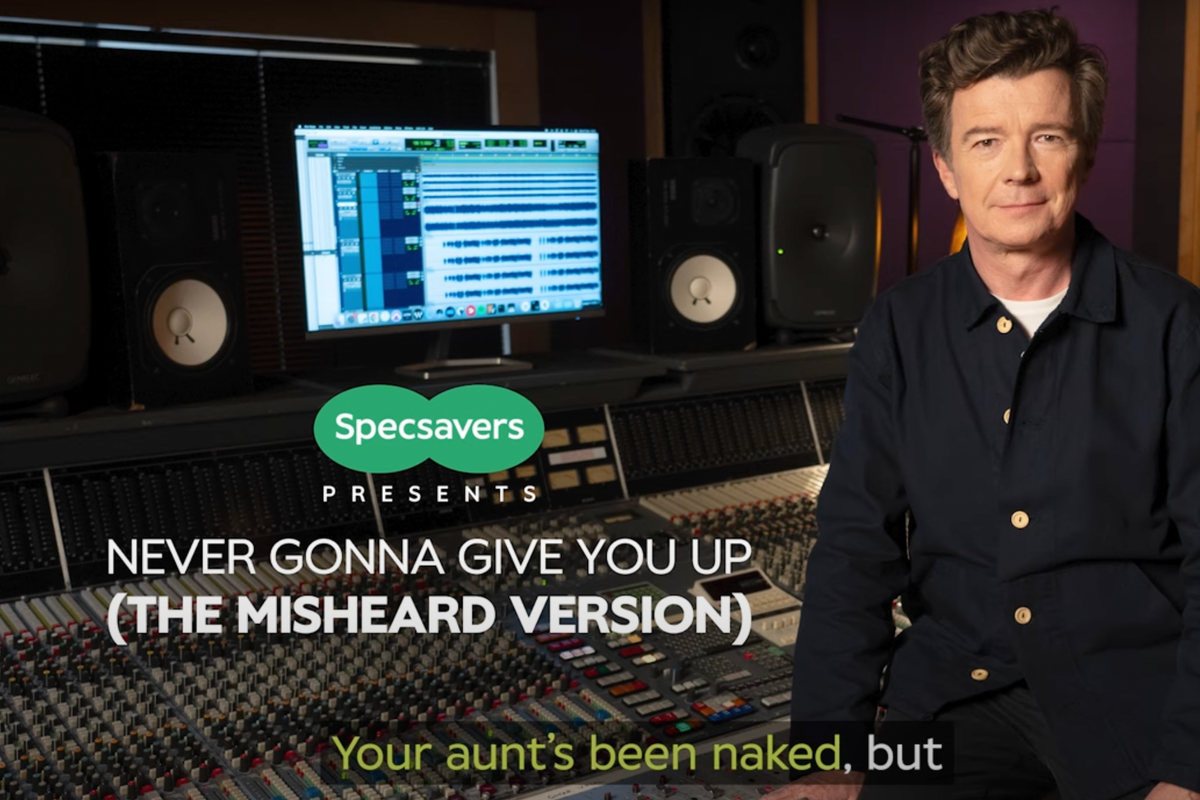Rick Astley re-records 'Never Gonna Give You Up' but with all the commonly misheard lyrics
Can you spot all the changes?

"Then I'm gonna give you up…then I'm gonna let you down.."
Rick Astley fans, rejoice. The singer has just released a new recording of his biggest hit “Never Gonna Give You Up” on Oct 24.
Only this version might be…a little different than what you’re used to hearing. Unless of course you’ve been hearing it wrong this entire time.
That’s because this version incorporates all the commonly misheard lyrics associated with the 80s bop. Cause why not?In the new version of the track, you might notice “we’re no strangers to love” being replaced by “we’re no strangers to lunch,” as well as Astley, for some reason, singing “your aunt’s naked” and belting about running around with dessert spoons.
Listen:
That’s right, “don’t tell me not to plant a seed,” indeed! Free gardening for all!
Of course, this is more than just a fun cover. Astley partnered up with Specsavers to raise awareness of hearing loss—something the 80s icon struggles with himself and currently wears hearing aids to help with the condition.
In an interview with Alison Hammond and Dermot O’Leary on “This Morning,” Astley shared that he first started noticing issues while performing live shows again.
“I went to have my ears checked. I have noticed over the last few years, and we have in-ears when we play live and I’ve been turning them down over the past few years because I’ve noticed that it’s been too loud when I come off stage. I can hear it ringing,” he said.
Specsavers conducted a survey on 2,000 adults, and found that a little over 16% blamed their hearing for getting lyrics wrong. Meanwhile 28% admitted having difficulty hearing the TV or radio properly. And a whooping 51% find conversations with background noise difficult. (Daily Mail)
And yet, over half of the participants had never had their hearing tested. The reasoning for this could be twofold.
One, people might assume that only those like Astley, who’ve spent a majority of their life surrounded by loud noise, could be susceptible to hearing loss (in actuality, about one-third of older adults have hearing loss, and the chance of developing hearing loss increases with age). So they might not think that a misheard lyric here or there could be a sign of a larger issue.And two, some people might not want to admit that they are having hearing loss, embarrassed at the notion of having to wear hearing aids and being perceived as old or disabled.
And that’s why Specsavers sought the help of a pop icon in their campaign—to break any stigma surrounding hearing aids and inspire others to get their hearing tested.
“I’d encourage anyone to get their hearing tested if they notice any changes,” says Astley, “so they don’t lose the sounds or music they love.”- New Kids on the Block, Salt-N-Pepa, En Vogue and Rick Astley team up to deliver pure nostalgic joy ›
- Rick Astley says he was 'blown away' by Ted Lasso's use of his iconic song in emotional video ›
- Rick Astley covered Foo Fighters' 'Everlong' and it's shockingly great ›
- Husband's made up lyrics to popular rap song are hilarious ›
- Rick Astley performs a raw, acoustic version of 'Pink Pony Club,' and it slaps - Upworthy ›
- 13 popular misheard song lyrics and what they're actually saying - Upworthy ›

